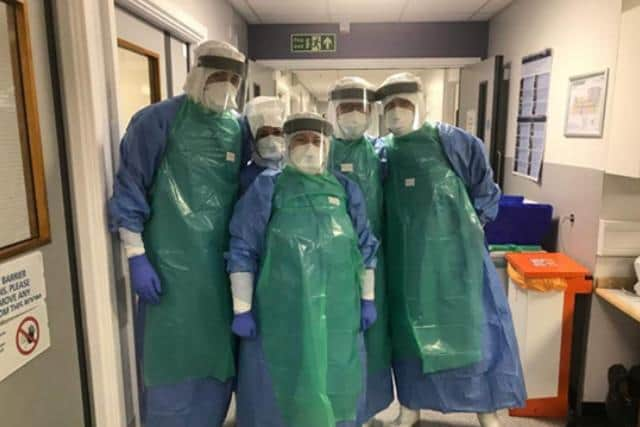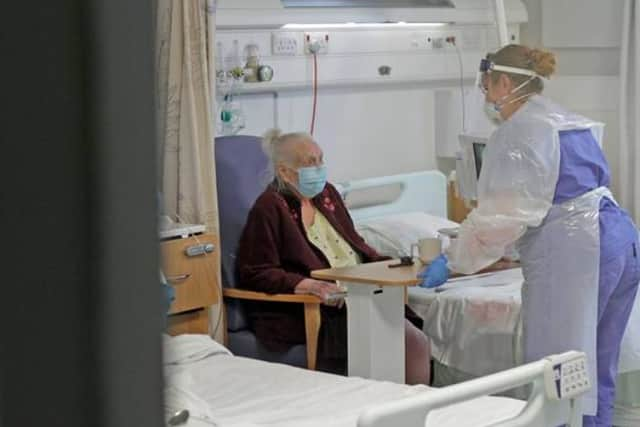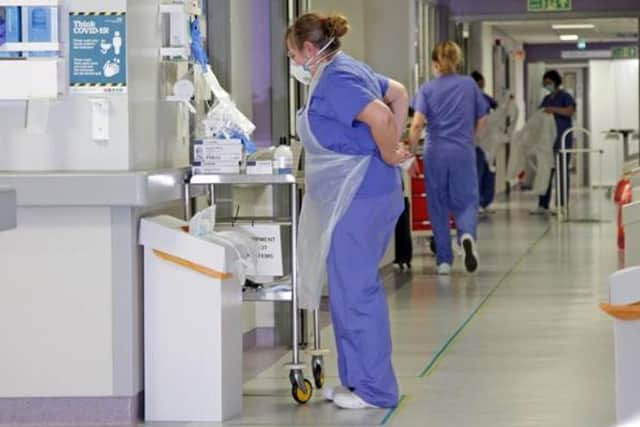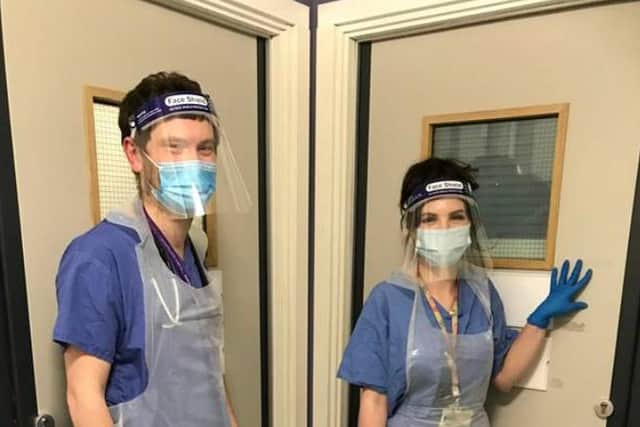Covid Sheffield: How city's hospitals have risen to the challenge since treating first coronavirus patients
and live on Freeview channel 276
They were among the UK’s first coronavirus patients when they were transferred to the hospital’s Infectious Diseases Unit and placed in quarantine there, having been repatriated from the stricken Diamond Princess cruise ship in Japan.
Little did the nation, or indeed the 17,000-strong workforce at Sheffield Teaching Hospitals, imagine then just what lay ahead in terms of lockdowns, loss and the life-saving vaccines which would eventually turn the tide in the battle against coronavirus.
Advertisement
Hide AdAdvertisement
Hide AdIn the 24 months since, NHS staff at the trust have cared for more than 8,300 Covid patients.


Across Sheffield in that time, nearly 165,000 people have tested positive and 1,482 have sadly died within 28 days of a positive test.
Kirsten Major, chief executive of Sheffield Teaching Hospitals, said: “This is a time for reflection and to take a moment to acknowledge the incredible efforts and often personal sacrifices which all our teams have made to ensure we could meet the demands of the pandemic.
‘Remarkable things’ achieved in the battle against Covid at Sheffield’s hospitals


“Collectively they have achieved remarkable things in terms of the Covid and non-Covid care we have been able to provide, the levels of innovation which has enabled services to continue and the contribution to world-leading research which has resulted in new Covid-19 treatments and vaccines.
Advertisement
Hide AdAdvertisement
Hide Ad"Not forgetting that they have also been pivotal along with other NHS colleagues in delivering the vaccination programme for South Yorkshire. The response we have seen from our own staff but also our many partners, charities and the public over these last two years has been awe-inspiring.
“Thankfully we are now seeing a reduction in the number of Covid patients being admitted and currently we have around 100 patients with the virus receiving care. This is about a third of the peak we saw over the Christmas and New year period. Staff sickness is also back down to much lower levels than we experienced throughout the peak of Omicron.”
Visiting restrictions have been eased as the pressure reduces, though people are still being asked to take sensible precautions like doing lateral flow tests and wearing a mask unless they have a valid exemption.


What impact has Covid had on wider healthcare in Sheffield?
And the pandemic’s wider impact on healthcare will likely be felt for a long time, with latest figures showing there are nearly 64,000 people on the trust’s waiting list, 1,149 of whom have been waiting for more than a year for an appointment.
Advertisement
Hide AdAdvertisement
Hide AdHowever, Ms Major pointed out that staff had continued to carry out as many operations, tests and cancer treatments as possible throughout the last two years and said its average waiting time was ‘one of the best in the NHS’, with most patients being treated within eight to 10 weeks of being referred by their GP.
She added that it was now experiencing a ‘significant’ rise in referrals as more people visit their GPs with different illnesses or injuries.


“Now that the latest wave of Omicron has started to reduce and some of the restrictions we had to put in place are being lifted we want to get even more operations, procedures and diagnostics done as quickly as we can for our patients,” said Ms Major.
“Our teams are tired and the challenges of COVID have not gone away but I also know that there is a collective eagerness to do all we can for those patients who have waited patiently for our care.
Advertisement
Hide AdAdvertisement
Hide Ad“In summary, we are seeing encouraging signs that we are moving towards brighter but no less challenging days and having the continued support and kindness from members of the public will be hugely important as we move into this next phase of delivering the care people need.”
What do we know about Sheffield’s first coronavirus patients?
Two years on, we don't know what happened to those first two patients, but while one remained anonymous, the other did speak out about his experience at the time.
Joel Rawlins, a pianist from Buckinghamshire, then aged 26, told how he had contracted the disease while working on the cruise ship and, speaking while still in isolation, assured people he was ‘doing absolutely fine and will be out before you know it’.
He was one of the first to experience the fantastic care provided by staff at the trust, praising them for the ‘incredible’ care they had provided since his arrival.
Advertisement
Hide AdAdvertisement
Hide AdThe pandemic has taken its toll on the mental health of staff at the trust, as it has with frontline NHS staff nationwide,
Figures released this time last year revealed a rise in the number of staff off due to work-related stress.
One member of staff spoke out about what he called the mental health ‘tsunami’, saying the trauma and long hours in protective gear had left employees feeling emotionally and physically shattered.
How have NHS staff in Sheffield been affected by battle against Covid?
But he acknowledged the trust’s efforts to support its workers, which included introducing dozens of ‘calm rooms’ and expanding its 24-hour counselling service.
Advertisement
Hide AdAdvertisement
Hide AdAlthough staff absences due to Covid added to the pressures, Sheffield Teaching Hospitals was praised early in the pandemic for its pioneering use of testing for employees, which ensured as many as possible were available to work without putting their colleagues or patients at risk.
The Royal Hallamshire’s Infectious Diseases Unit, where the first Covid patients arrived, remains one of just five NHS centres of excellence providing specialist care for high-consequence infectious disease (HCID) patients across the UK.
It’s because so little was known about Covid at the time that it was initially treated as an HCID, with staff needing to wear a high level of PPE to look after patients.
Although that is no longer the case, the unit has continued to play a crucial role in the fight against coronavirus, with more than a third of the patients cared for by the trust having been supported by the team there.
What is the Royal Hallamshire’s Infectious Diseases Unit and what does it do?
Advertisement
Hide AdAdvertisement
Hide AdAs the number of patients grew, the unit had to increase its capacity from 33 beds to 59 across three dedicated Covid wards, as well as opening two additional wards at peak times, all while continuing their normal work of caring for patients with more complex diseases like human immunodeficiency virus (HIV), viral hepatitis and tuberculosis (TB).
The team at the unit have also been responsible for recruiting almost 5,000 people, including more than 1,000 volunteers who have taken part in Covid-19 research studies for vaccines and different treatments which have proved instrumental in the fight against the virus.
And since last December, they have triaged approximately 700 highly vulnerable patients, including transplant recipients, those on chemotherapy and renal dialysis, and treated more than 300 of those patients through the Covid Medicines Delivery Unit, with pre-emptive treatment for Covid-19.
Patients in those groups who develop symptoms and test positive for Covid can access these new treatments which can reduce the risk of developing severe disease and admission to hospital by up to 80 per cent.
Advertisement
Hide AdAdvertisement
Hide AdDr Anne Tunbridge, consultant physician in infectious diseases at Sheffield Teaching Hospitals, said: “We are incredibly proud to have been able to use our expertise and experience to ensure patients with this awful virus got the care they needed.
“It has been one of the most challenging periods we can remember and whilst most of the people we have cared for have gone on to recover from the illness, there have also been times of great sadness and our hearts are with those who lost loved ones despite everyone’s best efforts.
“We are one part of a huge team of incredible staff across our hospitals, community services and support services who have worked tirelessly to manage the impact of this pandemic and personally I am in awe of each and every one of my colleagues.”
She added that the virus has not gone away, and she urged people to ensure they are fully vaccinated, continue washing their hands regularly and to limit contact with others if they develop symptoms.
